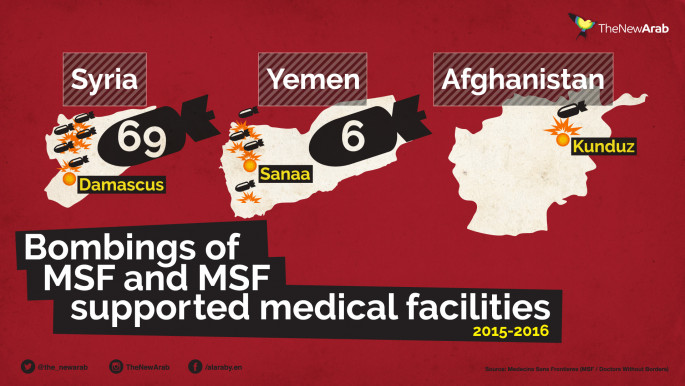75 MSF medical facilities attacked in past year
Airstrikes targeting a UN-Arab Red Crescent aid convoy in the Aleppo suburb of Urum al-Kubra signalled the end of a US-Russian brokered ceasefire for Syria, and consequent bombardment by Syrian regime and Russian warplanes on rebel-held districts of east Aleppo has seen two hospitals rendered out of service in the last week.
On Friday Doctors Without Borders [MSF] released a statement "demanding" that the Syrian regime and its international allies stop their bombing campaigns in the city.
Between 21 and 26 of September the Directorate of Health in east Aleppo reported that those hospitals still functioning in the area had received more than 822 wounded, and more than 270 dead bodies of which at least 96 were children.
Doctors Without Borders has described attacks on medical facilities as a "red line" noting that in the context of Aleppo airstrikes on hospitals would have devastating medical consequences for civilians.
In a press statement put out by the organisation Dr Abu Waseem, manager of an MSF-supported trauma hospital in east Aleppo relayed the desperate conditions in which staff in the facility must work.
"All intensive care units are full. Patients have to wait for others to die so they can be moved to an available bed in intensive care. We only have three operating theatres and yesterday alone we had to do more than 20 major abdominal surgeries … the hospital staff is working up to 20 hours a day – they cannot just go home and let people die."
 |
Speaking in front of the UN Security Council in New York on Wednesday Joanne Liu, MSF's international president, reminded the council that in May they had unanimously passed Resolution 2286 aimed at safeguarding the lives of medical professionals working in conflict zones.
"You, the Council Members, pledged to protect civilians and the medical services they need to survive. You passed the resolution in the wake of the obliteration of Al Quds Hospital in Aleppo by the Syrian government and its allies.
"Five months later, the resolution has plainly failed to change anything on the ground," continued Liu, noting that four out of five permanent members of the security council had been implicated in the attack.
Since a US airstrike on a MSF medical facility in Kunduz, Afghanistan on October 3 2015, which killed 42 people including 14 MSF staff, a further 75 MSF and MSF facilities in Syria and Yemen have been attacked.
In Yemen six attacks have taken place including a Saudi-led coalition airstrike against the Abs Hospital in Hajjah governorate of northwest Yemen on 15 August that resulted in 19 deaths.
A huge total of 69 attacks have occurred in Syria. Liu has noted gravely that in Syria "they never end".
On Thursday Russia rejected a US proposal for a seven day ceasefire in Aleppo. Given the indiscriminate nature of Syrian regime and Russian bombing campaigns in the city it appears only a matter of time until Resolution 226 is violated once again, and medical professionals and civilians are once again forced to suffer as a result of conflicts beyond their control.



